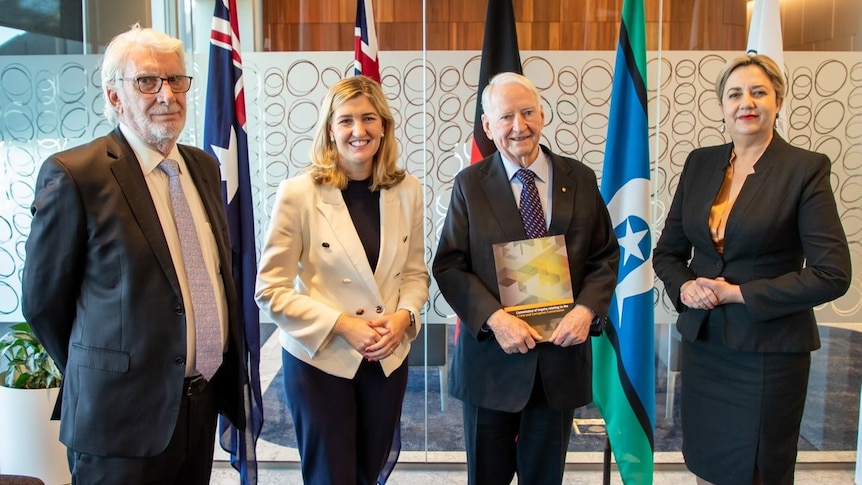Queensland’s corruption watchdog needs to consult with the state’s Director of Public Prosecutions (DPP) before laying charges to avoid “unwarranted impact” of its investigations and rebuild public confidence, a new report has recommended.
Key points:
- The inquiry finds the Logan City Council probe damaged perceptions of the CCC
- It identifies risks associated with the CCC employing former police as investigators
- Premier Annastacia Palaszczuk says the recommendations are “very sensitive”
It is one of a string of recommendations from a Commission of Inquiry relating to the Crime and Corruption Commission (CCC).
The inquiry’s report, handed to the Queensland government today, also recommends the CCC reduce its reliance on police officers as staff.
It identifies “two key risks” associated with the employment of seconded police in the CCC.
The inquiry was co-chaired by retired Supreme Court justice Alan Wilson QC and Tony Fitzgerald, who is best known for heading the Fitzgerald Inquiry, which uncovered systemic corruption in Queensland 35 years ago.
It was announced by Premier Annastacia Palaszczuk in January.
The inquiry was commissioned as a result of a recommendation from a Parliamentary Crime and Corruption Committee report into the CCC’s investigation and decision to charge eight Logan City councilors with fraud in 2019.
The charges were dropped in court due to a lack of evidence and today’s report found those events adversely affected Queenslanders’ perceptions of the CCC.
The original Fitzgerald Inquiry’s recommendations led to the creation of the Criminal Justice Commission, the precursor of the CCC.
The new inquiry made 32 recommendations about the CCC’s structure and operation “that must be implemented collectively” to bolster public confidence.
Upon receiving the report, Ms Palaszczuk said the recommendations were “very sensitive”.
“On the face of them, there is nothing here that I cannot see our government implementing,” she said.
What has been recommended?
The inquiry heard 87 submissions from stakeholders and members of the public including from the former chair of the CCC Alan MacSporran.
Its recommendations focus on refining the CCC’s process of laying charges and reducing its reliance on police staff.
They highlight risks of “institutional capture” by the Queensland Police Service (QPS) – in which the interests of the QPS are prioritized over the interests of the public – and a risk that corruption investigations might place an “undue emphasis on law enforcement”.
The report makes clear the use of seconded police officers by the CCC is appropriate and should continue, but recommends the watchdog predominantly employs people outside of the police and armed services.
It also recommends creating a Corruption Strategy and Prevention Unit within the CCC, as well as a dedicated training and development officer.
Attorney-General Shannon Fentiman has focused on another recommendation — amending the Crime and Corruption Act to make the CCC consult with the DPP before laying charges to ensure the charges can be properly brought to court.
“I think that is a really key recommendation, particularly as this commission of inquiry arose from the PCCC’s inquiry into what happened in Logan City Council,” Ms Fentiman said.
She said the specialist team would be created within the DPP.
“That will review all of the evidence collated by the CCC and make a recommendation to the CCC.
“It then goes back to the CCC once the matter then comes to be prosecuted a different team of prosecutors will looks at it.
“We’ll take advice from the DPP about the kind of resources they need in order to do this work.”
What about the Logan councillors?
The inquiry’s report said it would not revisit or re-litigate the investigation of the Logan council.
Ms Palaszczuk did not comment on whether Logan City Council would be issued an apology.
“No-one would like to see what happened to those particular councilors happen again,” Ms Palaszczuk said.
“That report is very clear about a path forward … so we would probably not see the likes of that happening again – that would be my expectation.”
The report also raises additional issues outside its scope, including the potential of delaying the suspension or sacking of councilors until they have pleaded guilty or are committed to trial.
Ms Fentiman said the government would also consider those issues.
The report will be considered by cabinet on Monday.
The Premier said it would take some time to implement the recommendations.
“On the face of them, there is nothing here that I cannot see our government implementing,” Ms Palaszczuk said.
CCC chair Bruce Barbour said the watchdog would immediately commence implementing the recommendations.
“We thank the Commission of Inquiry for the opportunity to participate in the review and its engagement with the CCC,” he said.
.
